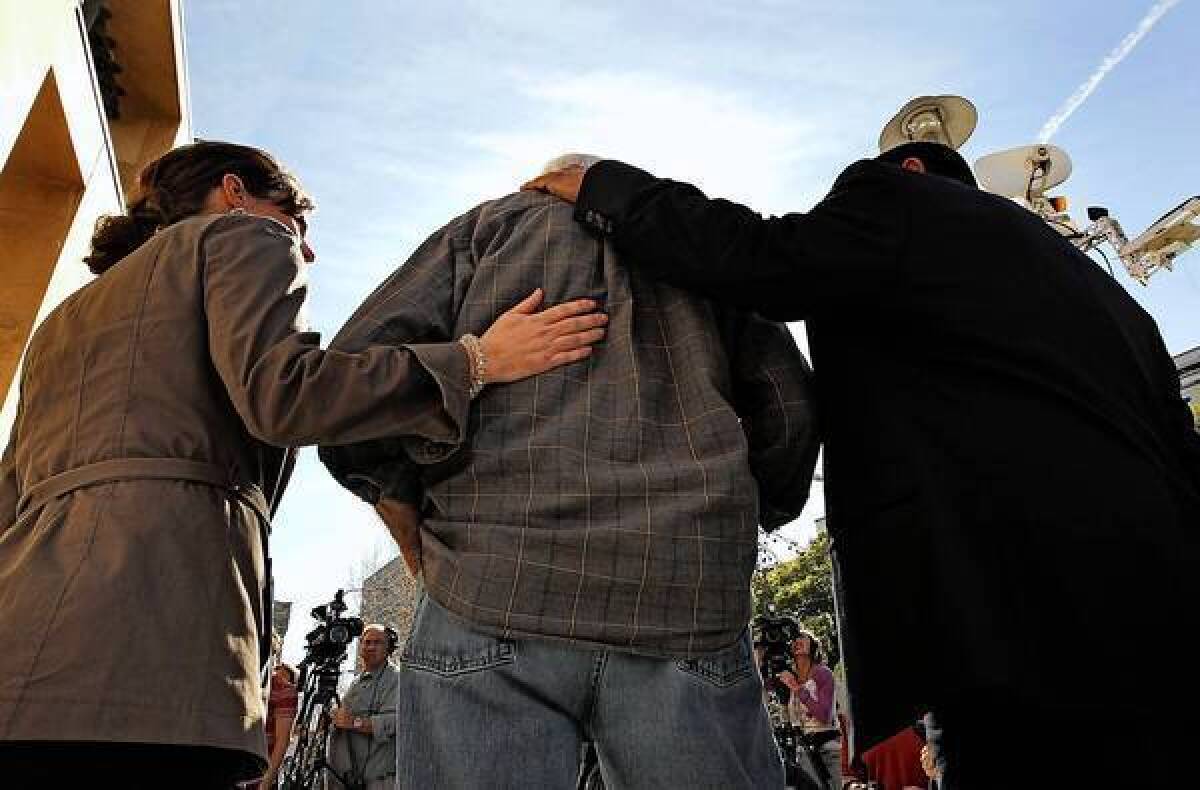Brown vetoes bill giving sex abuse victims more time to file lawsuits

SACRAMENTO â Gov. Jerry Brown vetoed a bill that would have given some childhood sex abuse victims more time to file lawsuits, after a heated opposition campaign led by the Catholic Church that stretched from Capitol hallways to Los Angeles church pews.
In an unusually detailed three-page veto message released Saturday, the Democratic governor, a former Jesuit seminarian, said the bill raised questions of equal treatment of public and private employers. Pointing to a centuries-long tradition of limiting the period when legal claims can be filed, Brown said institutions should feel secure that âpast acts are indeed in the past and not subject to further lawsuits.â
He also argued that the legislation, which would have in part lifted the statute of limitations on sexual abuse claims for one year to allow some childhood victims to file lawsuits, was âunfairâ because it singled out private organizations, such as Catholic dioceses and the Boy Scouts. Public schools would not have been affected by the bill, something Brown called âa significant inequity.â
âThe children assaulted by Jerry Sandusky at Penn State or the teachers at Miramonte Elementary School in Los Angeles are no less worthy because of the nature of the institution they attended,â Brown wrote, referring to two recent abuse scandals at public institutions.
Sen. James Beall Jr. (D-San Jose), who introduced the bill, called Brownâs veto âa retreat in the fight to protect our children.â
âI am sad for the adult survivors of childhood sexual abuse who have been denied the opportunity to have their day in court to confront the people who knowingly allowed their employees to harm children,â he said in a statement.
Groups representing abuse victims and plaintiffs attorneys also condemned the governorâs decision.
âWe hope that victims only see this as one lost battle in a long war to punish wrongdoers and keep Californiaâs children safe,â said Joelle Casteix, western regional director of SNAP, or the Survivors Network of those Abused by Priests.
The bill was modeled after one that passed in 2002, during the height of the Catholic Church sex abuse scandal, which gave alleged victims a one-year window to sue employers who may have failed to protect them from known molesters.
That legislation resulted in the church paying $1.2 billion in settlements. The church was also forced to release a slew of internal records that showed its leaders, including Cardinal Roger M. Mahony of Los Angeles, discussing how to shield admitted molesters from police.
Beallâs bill would have applied only to accusers who were 26 or older during the last window in 2003, did not file a lawsuit and later discovered abuse-related psychological problems. A California Supreme Court decision barred them from suing.
It is unclear how large that group is. During the 2003 window, the Archdiocese of Los Angeles expected fewer than 100 people to sue; about five times that many did.
Only three other states â Delaware, Hawaii and Minnesota â have approved temporary suspensions of the statute of limitations on childhood sexual abuse claims. Similar efforts in some other states have been thwarted in part by the churchâs ability to rally lawmakers to its side.
In Sacramento, the church led the campaign against Beallâs bill, though it also drew opposition from the YMCA, USA Swimming and some private schools. Bishops lobbied lawmakers and urged parishioners to press their representatives to scuttle it. A group affiliated with the church spent tens of thousands of dollars on an effort to quash the legislation.
Auxiliary Bishop Gerald Wilkerson of the Archdiocese of Los Angeles, president of the churchâs political arm, welcomed the governorâs action. âWe hope the way the Catholic Church in California has responded to the abuse crisis over the last 10 years and âwalked the walkâ with respect to protecting young people and reporting allegations to law enforcement helped play a role,â he said in a statement.
Debate over SB 131 was fervid and at times emotional. During several hearings, two lawmakers â Sen. Ricardo Lara (D-Bell Gardens) and Assemblywoman Nancy Skinner (D-Berkeley) â spoke about their own abuse as children. So did a well-known lobbyist, Paula Treat. They argued that victims need extra time to file suits because it often takes decades to admit that they were molested.
âI was alone trying to understand what happened to me for many years,â Lara said during a floor debate in which he disclosed he was abused by a family member. âI couldnât go to anyone.â
The billâs opponents, including private schools and nonprofit groups, argued it is difficult to mount a defense against decades-old accusations because of lack of evidence and the death or infirmity of key witnesses. They also said the bill would be a boon to trial attorneys.
The bill passed out of each chamber on a razor-thin margin. In the Assembly, it was three votes shy of passage, until backers extended the final vote for nearly an hour to round up supportive lawmakers.
âYou could, on the floor, see people almost visibly struggling with the issue,â Assemblyman Roger Dickinson (D-Sacramento), who voted for the bill, said afterward. âNobody believes that someone who has perpetrated sexual abuse, especially against a child, should escape accountability for that kind of behavior.â
But he added, âMany of them were very torn between that first sense and that second sense of belief in, and loyalty to, institutions that they hold in high regard.â
Powers reported from Los Angeles and Mason from Sacramento. Times staff writer Patrick McGreevy in Sacramento contributed to this report.
More to Read
Sign up for Essential California
The most important California stories and recommendations in your inbox every morning.
You may occasionally receive promotional content from the Los Angeles Times.











